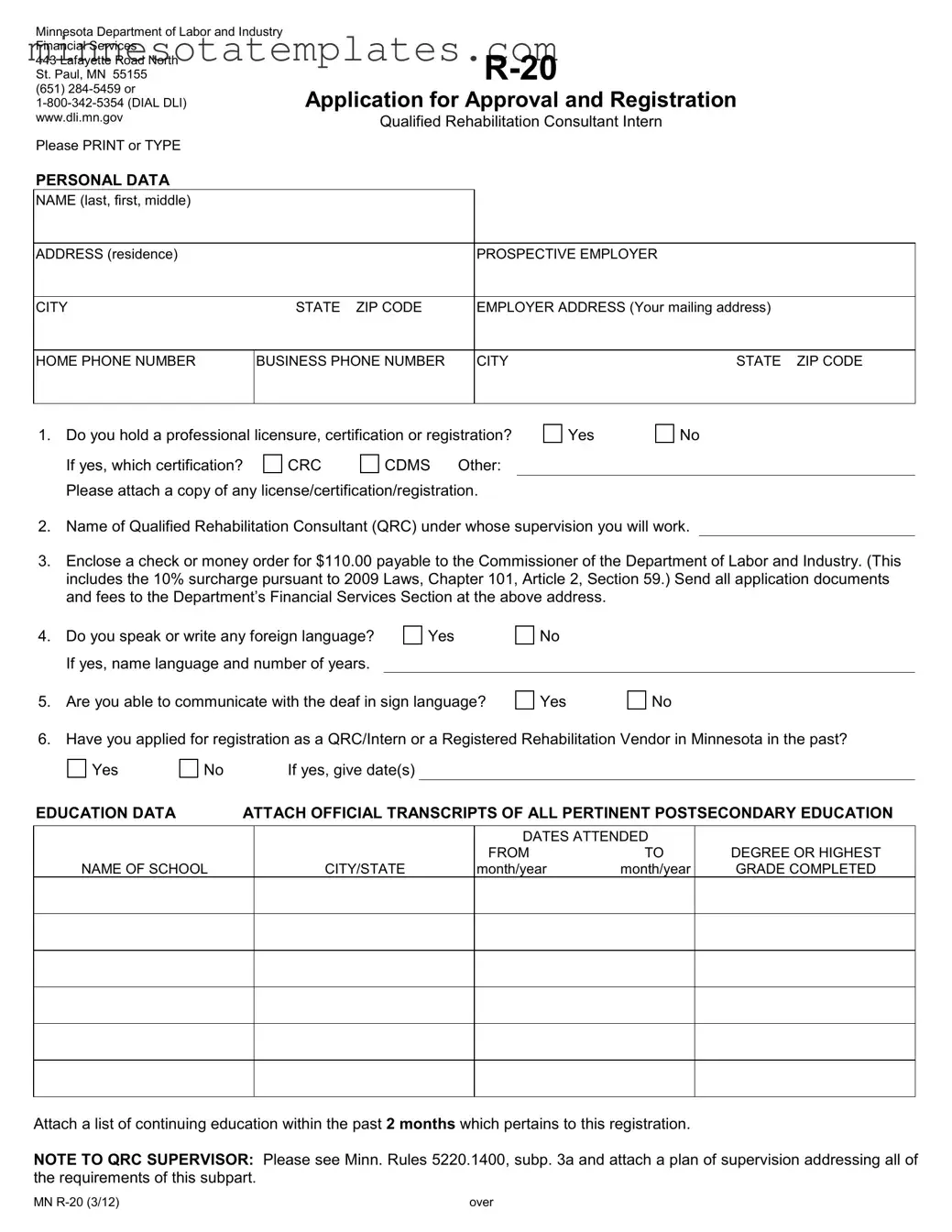Blank Minnesota R 20 Template
The Minnesota R 20 form serves as a critical application for individuals seeking approval and registration as Qualified Rehabilitation Consultant Interns. This form, issued by the Minnesota Department of Labor and Industry, requires applicants to provide essential personal data, including their name, address, and contact information, along with details about their prospective employer. Applicants must also disclose any relevant professional licensure, certifications, or registrations they hold, which can enhance their qualifications. A fee of $110 is mandated, which covers the processing of the application. Furthermore, the form emphasizes the importance of education and employment history, requiring applicants to submit official transcripts and detailed descriptions of their work experiences. Additional sections inquire about language proficiency and the ability to communicate in sign language, reflecting the diverse needs of clients in the rehabilitation field. The R 20 form also includes a section for the Qualified Rehabilitation Consultant who will supervise the intern, ensuring that a structured plan of supervision is in place. This multifaceted application underscores the commitment to maintaining high standards in the rehabilitation consulting profession while facilitating the growth of new professionals in Minnesota.
Key takeaways
When filling out and using the Minnesota R 20 form, consider the following key takeaways:
- Personal Data: Ensure all personal information, including your name, address, and contact numbers, is printed clearly and accurately.
- Licensure Information: If you hold any professional licenses or certifications, attach copies of these documents as required.
- Employer Details: Provide the name and address of your prospective employer, as well as the name of the Qualified Rehabilitation Consultant (QRC) under whom you will work.
- Application Fee: Include a check or money order for $110.00 made out to the Commissioner of the Department of Labor and Industry.
- Education Records: Attach official transcripts from all relevant postsecondary education, along with a list of any continuing education completed in the last two months.
- Employment History: Detail your work history, starting with your most recent job. Be thorough in describing your duties and responsibilities.
- Communication Skills: Indicate if you can communicate in any foreign languages or use sign language, as this information may be relevant.
- Certification: By signing the application, you agree to comply with all regulations and understand the consequences of any misrepresentation.
Misconceptions
There are several misconceptions surrounding the Minnesota R 20 form, which is essential for those seeking approval and registration as a Qualified Rehabilitation Consultant Intern. Here are seven common misunderstandings:
- It’s only for licensed professionals. Many believe that only individuals with a professional license can apply. However, while having a license is beneficial, it is not a strict requirement for all applicants.
- Only certain degrees are acceptable. Some think that only specific degrees qualify an applicant for the R 20 form. In reality, various educational backgrounds can be relevant, as long as they meet the required criteria set by the Department of Labor and Industry.
- All applications are automatically approved. There is a misconception that submitting the form guarantees approval. Each application undergoes a thorough review process, and approval is not guaranteed.
- The application fee is non-refundable. Many assume that the $110 fee is lost if the application is denied. However, in certain circumstances, applicants may be eligible for a refund if the application does not proceed.
- Previous applications have no bearing on current applications. Some believe that past applications do not affect future ones. In fact, if an applicant has previously applied, they must disclose that information, as it may influence the review process.
- Foreign language skills are optional. It is often thought that language skills are not important. However, the form specifically asks about foreign language proficiency, which can be a valuable asset in rehabilitation consulting.
- Supervision is not required for interns. Many applicants think they can work independently right away. In truth, all interns must work under the supervision of a Qualified Rehabilitation Consultant, as outlined in the application process.
Understanding these misconceptions can help applicants navigate the registration process more effectively and ensure they meet all necessary requirements.
Additional PDF Templates
Minnesota Eviction Laws - Landlords can file this form in the appropriate district court, streamlining the process.
The ST-12B Georgia form is essential for individuals looking to reclaim sales tax on their purchases. By providing detailed transaction information and specifying the dealer, this affidavit simplifies the refund process. For more guidance on filling out this important form, you can visit Forms Georgia, which offers resources to assist taxpayers in Georgia.
Post Office Forms - Distillers must engage with this form diligently to align with state and federal regulations.
Temporary Fuel Permits - The application is designed to be user-friendly, guiding applicants through the necessary steps.
